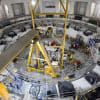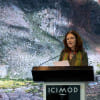Organic foods perhaps good for you, but bad for environment

Organic food has been on the rise since it came into fashion; vegetables, fruit, grains, dairy and meat grown and processed using non-conventional methods not only tend to carry a hefty price tag, but are usually thought to be of higher quality and better for health, although production of organic food products may not be good for the environment.
"Our study shows that organic peas, farmed in Sweden, have around a 50 percent bigger climate impact than conventionally farmed peas," said an associate professor at Chalmers University of Technology in Sweden, Stefan Wirsenius.
Recently, it was reported that organic food had a larger impact on the Earth's climate than previously thought, mostly because of how much land is required to grow it compared to conventionally grown food, according to the Economic Times.
Organic food has become so popular in the United States that the US Department of Agriculture has even provided certain requirements for certification of organic products depending on how much of the product is made organically.
Putting aside the health benefits, the yields each hectare produces for organically grown food is much lower than conventionally grown food because of the lack of fertilizers.
"For some foodstuffs, there is an even bigger difference -- for example, with organic Swedish winter wheat the difference is closer to 70 percent," Wirsenius said.
To produce the same amount of food organically as is grown conventionally, farmers need more land, according to researchers. Other foods such as organic meat and milk, produced by organic-fed livestock, also require more land and resources, which is bad for climate change.
"The greater the land use in organic farming leads indirectly to higher carbon dioxide emissions, thanks to deforestation," Wirsenius explained.
"If we use more land for the same amount of food, we contribute indirectly to greater deforestation elsewhere in the world," he added.
Copyright: The Jakarta Post/ Asia News Network (ANN)

 For all latest news, follow The Daily Star's Google News channel.
For all latest news, follow The Daily Star's Google News channel. 








Comments